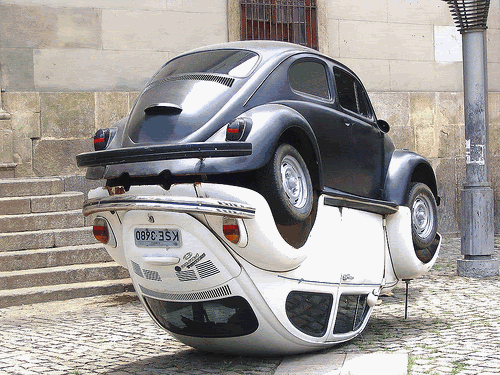“Americans will put up with anything provided it doesn’t block traffic.”
– Dan Rather
Traffic is a minor miracle.
It’s a dance, and a competition. The stakes are incredible – driving at 60mph in a crowd of other cars is likely your most dangerous activity of the week. Each time you enter the fray, a stranger may have saved your life, and you may save another’s life in return. How many times do we avoid an accident because someone else was paying attention?
Traffic is a metaphor for society, and a microcosm of society. It embodies the contradictions of common direction and unique purpose. No two vehicles are going to the exact same place, for the exact same reason, yet instead of chaos – we produce flow. Traffic is emergent – a temporary coalition changing from instant to instant, with the common goal of delivering it’s members. Yet this coalition and this goal are completely the result of isolated individuals acting on their own behalf.
A conservative might tell you that traffic exemplifies Smith’s invisible hand. Flashing along the byways in formation, it is each person’s self-interest that makes the whole safe enough to be feasible. Heroism without altruism. The errors of the few are usually self-correcting, because the determination of the many is to arrive home safely. “Drive defensively”, they tell you, and indeed this web of selfish fear is simultaneously a powerful safety net for the group. Traffic exhibits Conservatism.
A progressive might tell you that traffic is a living example of engineering towards the greatest good. No highway is optimal for every trip, and yet highways empower and enable their passengers. A traffic light stops you, and yet without lights your trip would be more difficult at best, and impossible at worst. Offramps mean you can’t get off exactly where you want, yet it is only because of offramps that we can achieve smooth, laminar flow instead of brownian motion. Traffic is an exercise in collective optimization, impossible without systemic thinking – which lies at the core of progressive philosophy. Traffic is Progressive.
Traffic is defined by conservatism and progressivism in equal measure, each opposing, supporting and transforming the other. A failure of conservatism produces the deadly anarchy of a drunken driver. A failure in progressivism erupts into the choking stasis of gridlock. A dynamic balance between the two produces the lone motorist swirling smoothly through the arteries of society, a packet of singular intent in the greater stream.
When you punch through to the core of things, the great conflicts of our times revolve around separate goals and common resources. The peoples of Israel and Palestine have different needs, yet share the same land. Democrats and Republicans have different goals but are bound by the same national policies. Wall Street and Main street have the same goals – but different methods, and they share the same socialized risk. Confined within the same spheres as our opponents, we tend to devolve every conflict into a zero sum game, with winners and losers. Sharing, compromise, is considered a loss for both sides.
But these problems aren’t intractable. We know that because, daily, hundreds of millions of us embark on a ritual of broad trust and personal responsibility. We submerge ourselves completely in the hive mind of the world’s freeways, without losing more than we gain, and in the service of our own ends. We share, every day, and we do it effectively – indeed, this act is so engrained that many of us can’t remember our drive to work, and yet the sheer scale of this cooperation dwarfs the building of the Pyramids. According to abc, 220 million Americans average 90 minutes a day in their cars.
That’s a quarter of a billion people working individually and cooperatively, lives in each other’s hands, every day.
But how do we map this model to more focused problems? Perhaps the key is in that unique balance of conservative and progressive our traffic exploits. People need to be responsible for their “end” of any solution, and this participation must be in their best self-interest. Centralized control of a system can only be so granular, at some point the system must be self-healing. The dynamics of the system, sans control, must tend to stability. Sting put it best, when writing about the psychology of Mutually Assured Destruction: “I hope the Russions love their children too”. This “love of children” must be a part of any enduring solution.
On the other hand, the wider goals of the solution must be maintained through systemic thought, and strategic policy. We must be willing to change the face of society, and shape our reforms at the largest scales. We must provide the channels and boundaries by which self interested individuals may reach an approximation of their natural goals, with an eye towards maximizing aggregate performance. By doing so, we free people to operate far beyond where their sole efforts could have taken them. Essentially, we need to teach people to drive, then put them on highways.
But of course, those are just clumsy attempts at incorporating the lessons of the freeways. Traffic stands as it’s own set of contradictions, simultaneously a stunning triumph of engineering and something that simply evolved. Collective behavior in service of individual goals, a rationale for diametrically opposed schools of political thought. Both a working model of society and a Zen Koan on society’s very purpose, Ying and Yang writ large in exhaust fumes.

Traffic is dangerous, and essential. Traffic is mundane. But mainly,
Traffic is a miracle.





22 comments